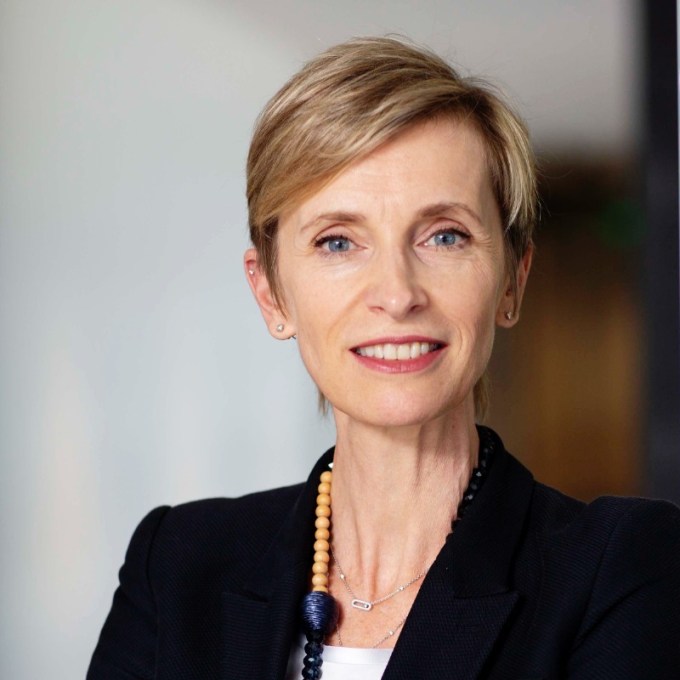The relationship between fintechs and incumbents has long been fraught with tension. But Marie-Elise Droga believes it doesn’t have to be this way.
Droga joined payments giant Visa as SVP, head of global and NA fintech partnerships in December 2022 to lead the development, commercialization and implementation of all Visa products, new payment flow solutions and “value-added” services for Visa’s fintech partner network.
“I work with the earliest-stage orgs who are at the beginning of their journey and looking for solutions to grow before they even think of scaling, as well as global founders that may not be headquartered here,” she told TechCrunch in an interview. “Partners range from innovative fintech startups to established big tech.”
Droga says she thinks of herself as a creative and strategic global business builder with deep roots in sales and partnerships. Before she joined Visa, Droga was at Western Union where she says she became an expert in retail and digital cross-border payments, expanding the company’s relationships with such companies as Amazon, Airbnb and Google, as well as driving strategic efforts to accelerate digital growth and reinvent the company’s approach to channel distribution. And prior to Western Union, she led a variety of international sales and marketing organizations within companies such as Marietta Corporation, American Express, imago and Ray-Ban.
At Visa, Droga says she is focused on “identifying and synthesizing” factors that influence the payments landscape, including new behaviors, new stores of value, new frameworks for money movement and new transaction environments.
“It’s a very rich function that helps Visa be at the forefront of product innovation,” she added. “Our team is constantly challenging itself in terms of what trends do we have to pay attention to and how does that translate into growth, not only for our products, but also so we can have even more pertinent solutions for our clients.”
Looking ahead, Droga said she is excited to “focus on acquiring and developing partnerships across the entire payments ecosystem focused on fintech.”
TechCrunch sat down with Droga to hear more about her role and how Visa seeks to work with fintech startups. The interview has been edited for clarity and brevity.
What is Visa’s stance on the relationships between incumbents and fintech companies, and how do you approach your overall relationship with the fintech community?
Simply said, our fintech partnership practice is the growth engine of the organization. Fintechs are definitely not competition for us. They, first of all, helped digitize the payments sphere and global economy. They are an inherent part of our growth strategy – whether as a standalone partner – either by providing a solution to, or also more interestingly, as a way to help our legacy clients (banks) differentiate. We use them as a sounding board – a means to an end to help the core ecosystem grow and progress.
We also want to help service providers that have a strong interest to position themselves into tier one and tier two financial institutions and bring them technology that is potentially just too complex, too costly, and too too lengthy for them to develop in house.
Fintech and our network of partners in the space is a vital growth engine for Visa, and a key driver in realizing our mission – to uplift everyone everywhere. Our portfolio of fintech partners is diverse and continues to grow and scale. Over the last two years, the number of fintech card programs generating $1 billion in payment volume annually has more than doubled.
What are some specific ways you engage with fintechs?
We engage the fintech ecosystem through several programs to make it easier for fintechs to partner with us and tap into our network of partners. Fintech FastTrack, our flagship program for fintechs, is designed to help launch new financial features quickly – like launching a card program or moving money in near real-time with Visa Direct. We provide streamlined onboarding, turnkey access to hundreds of ecosystem partners, and simplified commercial agreements.
Additionally, Visa Ready is a certification program that helps technology companies build and launch payment solutions that meet Visa’s global standards around security and functionality. Visa’s Fintech Partner Connect builds clear pathways between Visa’s issuing clients and best-in-class fintech providers.
We also support up-and-coming businesses through programs and platforms that engage the fintech and start-up communities, including the Visa Accelerator Program in Asia Pacific and the Visa Innovation Program Europe, a fintech accelerator platform created for Southern Europe.
All that to say, we continuously evaluate and invest in companies that have the potential to advance digital payments for our clients and customers – ultimately viewing fintechs as strategic partners around the globe.

How involved are you with any potential acquisitions of fintechs?
We often collaborate with the Visa Ventures team. We are sort of a scout engine for Visa’s venture arm.
I know Visa has recently focused some very concerted efforts on serving creators. Can you share more about that, and how you view creators as an addressable market?
We see the creator economy emerging as the digital equivalent of tomorrow’s small and mid-sized business segments — or the new breed and next-generation of SMB clients. Yet, we recognize that even though creators typically have the same needs as a traditional small business, they are treated as individual consumers for the most part.
Despite being able to monetize, creators often don’t have access to adequate tools to sustain a successful business and manage their financial needs. From inconsistent cash flow and slow payouts from platforms to a lack of lending options and foundational knowledge to run a business – creators experience many of the same challenges as SMBs – but with less support.
Our efforts to uplift creators include working with platforms and payment service providers to allow creators to be paid faster and more efficiently, such as the ability to push funds instantly to a debit card, a wallet account, or in some cases a bank account in real-time or 1-2 business days.
By providing more optionality and faster rails, we help alleviate some financial pressure that may be bogging down many creators today.
Some of the initiatives Visa has developed to help support the creator economy, according to Droga, include:
- GetP@id Series: A social video series, which paired aspiring creators with established fashion, music, and food creators for a multi-week program that allowed mentors to share their knowledge about what it takes to build a successful career, offering firsthand coaching to mentees as well as viewers.
- Visa Ready Creator Commerce Program: A global initiative to help creator-centric platforms, such as social-commerce and video gaming companies, embed financial tools – like faster and more flexible payouts through Visa Direct and tipping and donations.
Want more fintech news in your inbox? Sign up for The Interchange here.































Comment